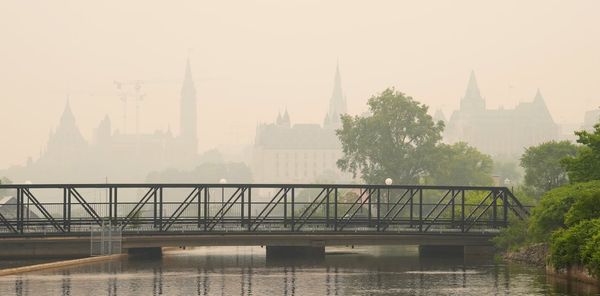
Who’s responsible for the poisonous haze that blanketed the north-east this week, that turned the sky eerie shades of yellow and orange and made the air over New York City more hazardous – for a time – than in any other place on Earth?
The smoke is from the unprecedented wildfires that, first sparked by lightning, have been raging for weeks in Nova Scotia and Quebec; more than 450 are now burning across Canada. More than half of those are considered “out of control”. That ferocity is thanks in large part to the kinds of unusually warm and dry conditions that rising temperatures are making more common. Winds from a low pressure system then fanned the flames and sent them southward.
The “what” behind this week’s haze is easier than the “who”, though. Legal processes in some states have assigned blame for past wildfires to specific companies. An investigation into the Marshall fire that devoured 1,000 Colorado homes in 2021 just pointed the finger at wayward sparks from Xcel Energy power lines. In northern California, courts charged the embattled utility PG&E with failing to maintain land and lines that have sparked several deadly fires over the last several years. The deadliest of those – the most destructive in the state’s history – killed 85 people and destroyed 14,000 homes. Last year the company agreed to pay $55m in penalties and costs to settle a series of civil cases brought against it by victims of the Kincaid and Dixie fires.
How about all the other stuff that makes those fires so bad? One analysis found that 60% of recent developments in California are in wildfire-prone areas, which might have something to do with the fact that the country’s largest property insurer just announced that it will stop taking on most new policies there.
And what’s causing all those hot, dry conditions? An analysis published last month in Environmental Research Letters examined how 88 of the world’s top greenhouse gas-emitting companies have contributed to global temperature rise and the ensuing dryness (“vapor pressure deficit”) that has made wildfires in the US more fearsome. Researchers also examined the amount of land burned. Using modeling to compare the world since 1901 against a counterfactual in which those companies’ emissions never existed, researchers found that those 88 companies were responsible for roughly half of the additional dryness experienced over that time period in the western US and south-western Canada. The same companies were responsible for 37% of the area burned by wildfires there since 1986, the study found.
Saudi Aramco sits at the top of that list of 88 fossil fuel and concrete companies, formerly 90 before mergers and acquisitions. That’s followed by Chevron, ExxonMobil, Gazprom and BP. It’s hard to assign too much blame to roughnecks, engineers or gas station attendants, though. It’s the top brass at those companies who map out corporate strategy, tasking more poorly paid employees to earn profits that congeal at the top. ExxonMobil chief executive Darren Woods enjoyed a 52% pay bump last year amid record profits; his employees’ pay fell by 9%. Shareholders who just rejected calls for Exxon and Chevron to set more stringent climate goals got fat payouts, too, of about $30m at each company. Still more galling is the fact that top executives at Exxon, Chevron, BP, Shell, Total and Eni got $15m worth of bonuses for meeting their own woefully inadequate climate targets.
Consumer demand fuels these companies’ decisions, to be sure. But there was no swell of drivers who asked Exxon or other polluters to fund the careers of self-described climate skeptics who spent decades working to stymie climate action in the US and abroad. One of those very ghouls popped up on Fox News this week to assure viewers that air pollution – responsible for 10m deaths per year – was nothing to worry about. And however direct fossil fuel companies’ links to recent fires in Canada may be, researchers at Harvard and several other universities have already found that air pollution from burning fossil fuels is responsible for one in five deaths worldwide.
As the smoke started to settle over the eastern seaboard, Twitter users began to snipe at one another, accusing the media of paying more attention to wildfire haze in New York and Washington DC after having allegedly neglected similar events out west. East coasters hit back. The right, meanwhile, set their crosshairs on Canada and its supposed “climate cult”, as Marjorie Taylor Greene put it.
It makes sense that anyone facing conditions as awful as those caused by the smoke this week would get angry. The trick is to get angry at the right people: fossil fuel billionaires who couldn’t care less about the horrors they’ve unleashed.
Kate Aronoff is a staff writer at the New Republic and the author of Overheated: How Capitalism Broke the Planet – And How We Fight Back










